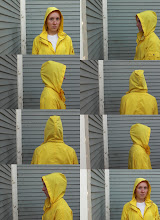We live our lives as though we have answered the great
questions, even though we may not have yet asked them. Everyone is a player in the game of
life, no one exempt from a set of beliefs, or a religion. “Everyone has a
religion.” (185) Some choose to believe in science, some choose to believe in “religion”,
some in both. No matter what position you play, you are in.
Our identity is knit close together in relationship with our
beliefs. Perhaps they are one in
the same. Part of our belief system
is our worldview. Perhaps they are one in the same. Perhaps we are our
worldview. As stated by Dr. Peck,
“…the most important factor in the development of the religion of most people
is obviously their culture.” (189) This makes our identity, our culture.
If we are a product of our environment, what
responsibilities do we have? What choices do we have if identity is thrown at
us? What happens when we are to question our beliefs, our identity?
When we play skeptic, our identity shifts, we experience crisis,
and we are faced with an opportunity to choose. We either choose positive growth or negative regression. We choose courage or we choose
laziness. Questions are present,
and our options constant, which path is ours? “The path to holiness lies
through questioning everything.”
(194)
In the process of questioning, one might ask, is God the
problem? Is Religion the problem? Or should Dogma be put on trial?
All of these questions important but, let us focus on dogma
for a time. Dogmatism is apparent in both religious believers, and in the world
of science among atheists and agnostics. Dogma can also be absent among
religious believers and those who label themselves atheist.
In the article “Tyranny of Principles” by Steven Toulmin, he
states, “Moral wisdom is exercised not by those who adhere to a single
principle unequivocally, for one absolute principle will inevitably conflict
with another absolute principle.” Wisdom sees paradox, wisdom sees a rainbow colored
world, a non-dogmatic world. Dogma is the killer of spiritual growth and love,
dogma is sick, not necessarily religion, not necessarily science.
Questioning not only dogma, but everything, is part of a
great sifting process. “In regard
to methodology, science has tended to say, ‘What is very difficult to study
doesn’t merit study.’ And in regard to natural law, science tends to say, ‘What
is very difficult to understand doesn’t exist.’”(228) On the other hand,
religious thinkers say, “’Miracles need not be scientifically examined’… ‘They
should simply be accepted as acts of God.’ The religious have not wanted their religion shaken by
science, just as the scientific have not wanted their science to be shaken by
religion.” (228)
Question everything, and think critically. Thinking
critically about our beliefs requires that we are careful not to confuse
correlation with causation. “The fact that two events occur together in time
does not necessarily mean that they are causally related.” (231) It isn’t
always easy to discern and critically categorize us, and our beliefs. “Balancing
is a discipline precisely because the act of giving something up is painful.”
(66) Giving up a part of our identity or beliefs is painful!
In Peck’s section on Balancing, he states, “…it is necessary
that the higher centers of our brain (judgment) be able to regulate and
modulate the lower centers (emotions).” (65) When we are in this state of mind,
we are able to more clearly think and make effective decisions. Balance involves
the discipline of seeing more, killing the narrow lens of the micro and birthing
the lens of the macro.
Analyze yourself, your beliefs, your culture, and your
worldview. Balance in flexibility
and reject dogma. Question everything. Is religion sick? Sometimes yes,
sometimes no. “But just as it is essential that our sight not be crippled by
scientific tunnel vision, so also is it essential that our critical faculties
and capacity for skepticism not be blinded by the brilliant beauty of the
spiritual realm.” (232)
